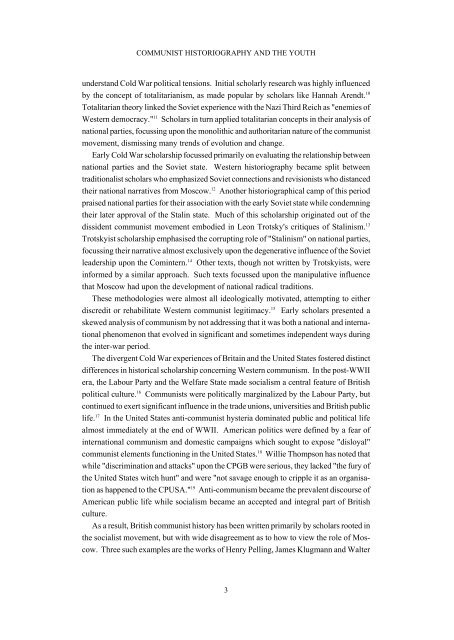Joel A Lewis Youth Against Fascism.pdf
Joel A Lewis Youth Against Fascism.pdf
Joel A Lewis Youth Against Fascism.pdf
You also want an ePaper? Increase the reach of your titles
YUMPU automatically turns print PDFs into web optimized ePapers that Google loves.
COMMUNIST HISTORIOGRAPHY AND THE YOUTH<br />
understand Cold War political tensions. Initial scholarly research was highly influenced<br />
by the concept of totalitarianism, as made popular by scholars like Hannah Arendt. 10<br />
Totalitarian theory linked the Soviet experience with the Nazi Third Reich as "enemies of<br />
Western democracy." 11 Scholars in turn applied totalitarian concepts in their analysis of<br />
national parties, focussing upon the monolithic and authoritarian nature of the communist<br />
movement, dismissing many trends of evolution and change.<br />
Early Cold War scholarship focussed primarily on evaluating the relationship between<br />
national parties and the Soviet state. Western historiography became split between<br />
traditionalist scholars who emphasized Soviet connections and revisionists who distanced<br />
their national narratives from Moscow. 12 Another historiographical camp of this period<br />
praised national parties for their association with the early Soviet state while condemning<br />
their later approval of the Stalin state. Much of this scholarship originated out of the<br />
dissident communist movement embodied in Leon Trotsky's critiques of Stalinism. 13<br />
Trotskyist scholarship emphasised the corrupting role of "Stalinism" on national parties,<br />
focussing their narrative almost exclusively upon the degenerative influence of the Soviet<br />
leadership upon the Comintern. 14 Other texts, though not written by Trotskyists, were<br />
informed by a similar approach. Such texts focussed upon the manipulative influence<br />
that Moscow had upon the development of national radical traditions.<br />
These methodologies were almost all ideologically motivated, attempting to either<br />
discredit or rehabilitate Western communist legitimacy. 15 Early scholars presented a<br />
skewed analysis of communism by not addressing that it was both a national and international<br />
phenomenon that evolved in significant and sometimes independent ways during<br />
the inter-war period.<br />
The divergent Cold War experiences of Britain and the United States fostered distinct<br />
differences in historical scholarship concerning Western communism. In the post-WWII<br />
era, the Labour Party and the Welfare State made socialism a central feature of British<br />
political culture. 16 Communists were politically marginalized by the Labour Party, but<br />
continued to exert significant influence in the trade unions, universities and British public<br />
life. 17 In the United States anti-communist hysteria dominated public and political life<br />
almost immediately at the end of WWII. American politics were defined by a fear of<br />
international communism and domestic campaigns which sought to expose "disloyal"<br />
communist elements functioning in the United States. 18 Willie Thompson has noted that<br />
while "discrimination and attacks" upon the CPGB were serious, they lacked "the fury of<br />
the United States witch hunt" and were "not savage enough to cripple it as an organisation<br />
as happened to the CPUSA." 19 Anti-communism became the prevalent discourse of<br />
American public life while socialism became an accepted and integral part of British<br />
culture.<br />
As a result, British communist history has been written primarily by scholars rooted in<br />
the socialist movement, but with wide disagreement as to how to view the role of Moscow.<br />
Three such examples are the works of Henry Pelling, James Klugmann and Walter<br />
3

















